2019大学英语四级考试听力备考笔记(28)
大学英语四级听力历年真题及详细解析

大学英语四级听力历年真题及详细解析大学英语四级考试是国内许多大学的必修课程之一,也是许多学生必须要通过的重要考试。
听力部分是四项考试项目之一,也是许多考生在考试中表现不佳的部分。
因此,本文将介绍大学英语四级听力历年真题及详细解析,以帮助读者更好地了解四级听力的难点和解题技巧,提高考试成绩。
一、历年真题1.2019年12月四级听力真题Section AQuestions 1 to 3 are based on the conversation you have just heard.1. Why did the man choose the job in the first place?2. What did the woman suggest the man do?3. What does the man think of the suggestion?Section BQuestions 4 to 6 are based on the conversation you have just heard.4. What did the man find difficult about learning the language?5. What does the woman think of the way in which the man learnt the language?6. What does the woman suggest the man do to improve his spoken language?Section C7. What is the talk mainly about?8. What kind of music do the following belong to: clave, conga and cowbell?9. Which of the following is NOT mentioned as a feature of salsa music?10. What is the purpose of the talk?二、解析1.2019年12月四级听力真题解析Section AQuestions 1 to 3 are based on the conversation you have just heard.1. Why did the man choose the job in the first place?解析:本题主要考察对于听力材料的理解,题干问为什么男人一开始选择这个工作。
四级听力笔记

在四级听力考试中,笔记是非常重要的一环,它可以帮助你记住关键信息,更好地理解听力材料。
以下是一些听力笔记的技巧和建议:1. 筛选无关信息:在听录音的时候,尽量专注于与题目相关的重要信息,忽略无关紧要的细节。
这样你就可以更有效地使用有限的笔记空间。
2. 使用缩写和符号:为了节省时间,可以使用缩写、符号或自己能看懂的简写来记笔记。
例如,你可以用“app”代替“application”,用“!”表示“important”,用“>”表示“more than”等。
3. 逻辑结构清晰:使用一些逻辑标记,如箭头、方框、括号等,来表明信息之间的关系。
这样可以更好地组织你的笔记,并在答题时更容易回忆起相关信息。
4. 记关键词:试着找出并记录下每个问题中的关键词。
这些词通常会出现在答案中,所以记下它们可以帮助你找到答案。
5. 预测答案:在听录音之前,先读一下问题和选项,预测可能的答案。
这可以帮助你在听的时候更有针对性地寻找信息。
6. 注意转折词:像“but”,“however”,“in contrast”这样的转折词通常会引出重要的信息或否定前面的观点,所以一定要留意这些词。
7. 多次重复的信息:如果某个信息在录音中被重复提及或强调,那么这个信息很可能是重要信息,一定要记下来。
8. 时间、数字和百分比:这些具体的信息在很多情况下都是重要的,所以一定要记下来。
如果时间、数字或百分比与录音中的其他信息相关联,那么一定要记下它们之间的关系。
9. 做题时尽量不看笔记:这样做可以模拟真实考试的情况,并且帮助你判断笔记的有效性。
10. 定期复习和改进笔记方法:每隔一段时间就回顾一下自己的笔记方法,根据实际情况进行调整和改进。
请注意,每个人的笔记习惯可能有所不同,因此你可能需要一段时间来试验和调整,找到最适合自己的方法。
祝你考试顺利!。
2019年6月大学英语四级听力高频词汇:t-v开头
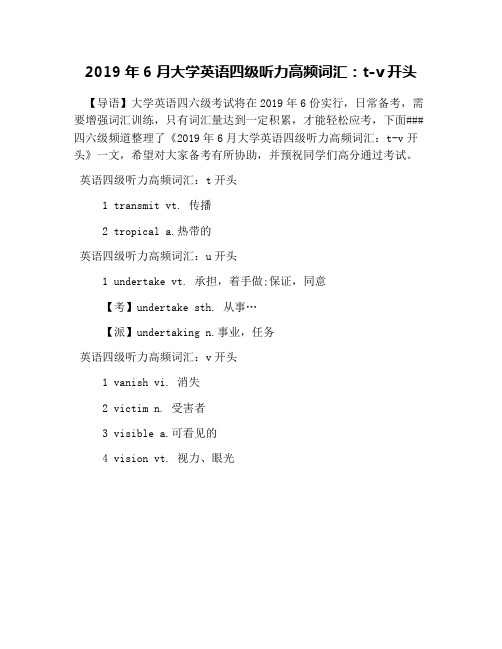
2019年6月大学英语四级听力高频词汇:t-v开头
【导语】大学英语四六级考试将在2019年6份实行,日常备考,需要增强词汇训练,只有词汇量达到一定积累,才能轻松应考,下面###四六级频道整理了《2019年6月大学英语四级听力高频词汇:t-v开头》一文,希望对大家备考有所协助,并预祝同学们高分通过考试。
英语四级听力高频词汇:t开头
1 transmit vt. 传播
2 tropical a.热带的
英语四级听力高频词汇:u开头
1 undertake vt. 承担,着手做;保证,同意
【考】undertake sth. 从事…
【派】undertaking n.事业,任务
英语四级听力高频词汇:v开头
1 vanish vi. 消失
2 victim n. 受害者
3 visible a.可看见的
4 vision vt. 视力、眼光。
2019大学英语四级考试听力备考笔记(25)
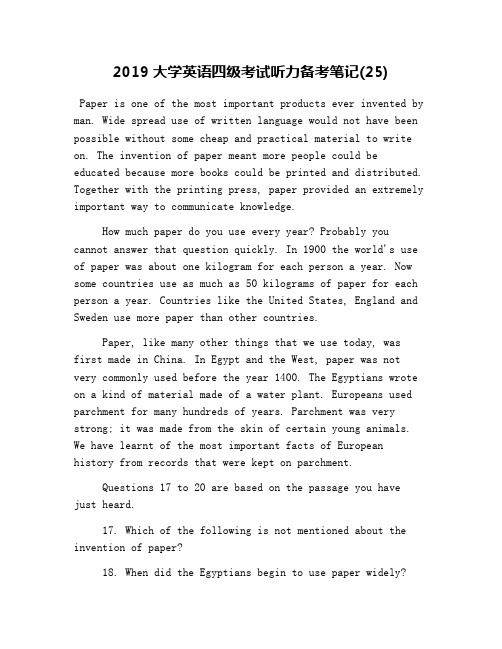
2019大学英语四级考试听力备考笔记(25)Paper is one of the most important products ever invented by man. Wide spread use of written language would not have been possible without some cheap and practical material to write on. The invention of paper meant more people could be educated because more books could be printed and distributed. Together with the printing press, paper provided an extremely important way to communicate knowledge.How much paper do you use every year? Probably you cannot answer that question quickly. In 1900 the world's use of paper was about one kilogram for each person a year. Now some countries use as much as 50 kilograms of paper for each person a year. Countries like the United States, England and Sweden use more paper than other countries.Paper, like many other things that we use today, wasfirst made in China. In Egypt and the West, paper was not very commonly used before the year 1400. The Egyptians wrote on a kind of material made of a water plant. Europeans used parchment for many hundreds of years. Parchment was very strong; it was made from the skin of certain young animals. We have learnt of the most important facts of Europeanhistory from records that were kept on parchment.Questions 17 to 20 are based on the passage you havejust heard.17. Which of the following is not mentioned about the invention of paper?18. When did the Egyptians begin to use paper widely?19. Which of the following countries uses most paper for each person a year?20. What is the main idea of this short talk?[P43-Three]topic 题,四个选项中有and应优先考虑题型总结:Section A:1、but 题型2、场景题(线索词)3、替换题(听到什么不选什么)Section B:1、主观题(找积极态度,正面评价)2、客观题(数字题,听到什么选什么)3、宏观题(中心思想题)4、细节题(注意中间的提示词)替换题paraphrase:1、词组与词的替换(一般题干中出现词组;选项中出现词)。
2019年12月大学英语四级考试听力真题-第二套
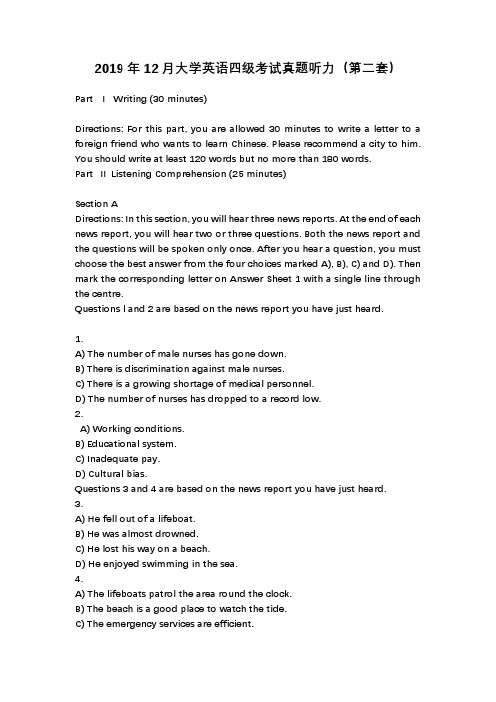
2019年12月大学英语四级考试真题听力(第二套)Part ⅠWriting (30 minutes)Directions: For this part, you are allowed 30 minutes to write a letter to a foreign friend who wants to learn Chinese. Please recommend a city to him. You should write at least 120 words but no more than 180 words.Part Ⅱ Listening Comprehension (25 minutes)Section ADirections: In this section, you will hear three news reports. At the end of each news report, you will hear two or three questions. Both the news report and the questions will be spoken only once. After you hear a question, you must choose the best answer from the four choices marked A), B), C) and D). Then mark the corresponding letter on Answer Sheet 1 with a single line through the centre.Questions l and 2 are based on the news report you have just heard.1.A) The number of male nurses has gone down.B) There is discrimination against male nurses.C) There is a growing shortage of medical personnel.D) The number of nurses has dropped to a record low.2.A) Working conditions.B) Educational system.C) Inadequate pay.D) Cultural bias.Questions 3 and 4 are based on the news report you have just heard.3.A) He fell out of a lifeboat.B) He was almost drowned.C) He lost his way on a beach.D) He enjoyed swimming in the sea.4.A) The lifeboats patrol the area round the clock.B) The beach is a good place to watch the tide.C) The emergency services are efficient.D) The beach is a popular tourist resort.Questions 5 to 7 are based on the news report you have just heard.5.A) It climbed 25 storeys at one go.B) It broke into an office room.C) It escaped from a local zoo.D) It became an online star.6.A) Release it into the wild.B) Return it to its owner.C) Send it back to the zoo.D) Give it a physical checkup.7.A) A racoon can perform acts no human can.B) A racoon can climb much higher than a cat.C) The racoon did something no politician could.D) The raccoon became as famous as some politicians.Section BDirections: In this section, you will hear two long conversations. At the end of each conversation, you will hear four questions. Both the conversation and the questions will be spoken only once. After you hear a question, you must choose the best answer from the four choices marked A), B), C) and D). Then mark the corresponding letter on Answer Sheet 1 with a single line through the centre.Questions 8 to 11 are based on the conversation you have just heard.8.A) She received a bonus unexpectedly.B) She got a well-paying job in a bank.C She received her first monthly salary.D) She got a pay raise for her performance.9.A) Two decades ago.B) Several years ago.C) Just last month.D) Right after graduation.10.A) He sent a small check to his parents.B) He treated his parents to a nice meal.C) He took a few of his friends to a gym.D) He immediately deposited it in a bank.11.A) Join her colleagues for gym exercise.B) Visit her former university campus.C) Buy some professional clothes.D) Budget her salary carefully.Questions 12 to 15 are based on the conversation you have just heard.12.A) He has just too many things to attend to.B) He has been overworked recently.C) He has a difficult decision to make.D) He has just quarreled with his girlfriend.13.A) Turn to his girlfriend for assistance.B) Give priority to things more urgent.C) Think twice before making the decision.D) Seek advice from his family and advisor.14.A) His girlfriend does not support his decision.B) He is not particularly keen on the job offered.C) He lacks the money for his doctoral program.D) His parents and advisor have different opinions.15.A)They need time to make preparations.B) They haven’t started their careers yet.C) They need to save enough money for it.D) They haven’t won their parents’approval.Section CDirections: In this section, you will hear three passages. At the end of each passage, you will hear three or four questions. Both the passage and the questions will be spoken only once. After you hear a question, you must choose the best answer from the four choices marked A), B), C) and D). Then mark the corresponding letter on Answer Sheet 1 with a single line through the centre.Questions 16 to 18 are based on the passage you have just heard.16.A) Expressing ideas and opinions freely.B) Enriching social and intellectual lives.C) Acquiring information and professional knowledge.D) Using information to understand and solve problems.17.A) Traveling to different places in the world.B) Playing games that challenge one’s mind.C) Improving mind-reading strategies.D) Reading classic scientific literature.18.A) Participate in debates or discussions.B) Expose themselves to different cultures.C) Discard personal biases and prejudices.D) Give others freedom to express themselves.Questions 19 to 21 are based on the passage you have just heard.19.A) Why dogs can be faithful friends of humans.B) The nature of relationships between dogs.C) The reason a great many people love dogs.D) How dogs feel about their bonds with humans.20.A) They behave like other animals in many ways.B) They have an unusual sense of responsibility.C) They can respond to humans’questions.D) They can fall in love just like humans.21.A) They stay with one partner for life.B) They have their own joys and sorrows.C) They experience true romantic love.D) They help humans in various ways.Questions 22 to 25 are based on the passage you have just heard.22.A) A rare animal.B) A historical site.C) A cow bone.D) A precious stone.23. A) Dating it.B) Preserving it.C) Measuring it.D) Identifying it.24.A) The channel needs to interview the boy.B) The boy should have called an expert.C) The boy's family had acted correctly.D) The site should have been protected.25.A) Conduct a more detailed search.B) Ask the university to reward Jude.C) Search for similar fossils elsewhere.D) Seek additional funds for the search.1-5 DACBA 6-10 BDCBD 11-15 CACBC 16-20 BCDAC 21-25 DABBD。
大学英语四级考试听力常考习语详解
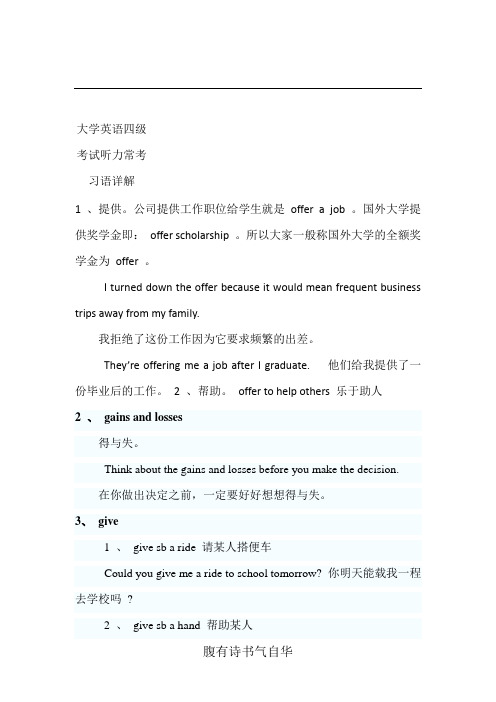
1 、提供。
公司提供工作职位给学生就是offer a job 。
国外大学提供奖学金即:offer scholarship 。
所以大家一般称国外大学的全额奖学金为offer 。
I turned down the offer because it would mean frequent business trips away from my family.我拒绝了这份工作因为它要求频繁的出差。
They’re offering me a job after I graduate.他们给我提供了一份毕业后的工作。
2 、帮助。
offer to help others 乐于助人2、gains and losses得与失。
Think about the gains and losses before you make the decision.在你做出决定之前,一定要好好想想得与失。
3、give1、give sb a ride 请某人搭便车Could you give me a ride to school tomorrow? 你明天能载我一程去学校吗?2、give sb a hand 帮助某人Can you give me a hand, Mike? 麦克,你能帮我一下吗?3、give sb a ring 打电话给某人I need to give Mum a ring and tell her I will not be back for dinner.我要给妈妈打电话告诉她不回去吃晚饭了。
4、go1、go broke 破产;身无分文2、go for a ride 乘车外出My sister wanted to go for a ride around town. 我的姐姐想乘车去镇上转一转。
3、go Dutch 各付各的4、go ahead 向前进;继续下去Go ahead, please. 请继续向前进。
专四听力听写部分技巧

第五页,共48页。
A. 小错误: 1)单词拼写错一到两个字母。例: steadily → staedily; harbor → habor 两个字母以下的词、次序颠倒算小错。 2)标点符号错误(含大小写)。例: World War I → world war one , and then adopted → . And then adopeted
第十七页,共48页。
B.由英美两种发音差异而导致的错误
The fees and ceremonies vary (very) greatly from state and state.
Today's family, however, can be composed of diverse combinations.(cambinations)
7.一些特例的扣分标准: 1)下列情况不扣分: in the past—in the past,;“now”后
加逗号。 2)下列情况扣分: throughout--through out(小错误);a
piece of—pieces of(两个小错,扣0.5分)
总分中如含分数的,分数舍去,留整数。如:12.5分一12分, 7.5分---7分。 8. 空白卷一律打0分。
注意单词中辅音字母的单双写问题。如 success, necessary, command, disappear, commonplace, attitude, communication
2019年12月英语四级真题第二套(含听力原文)
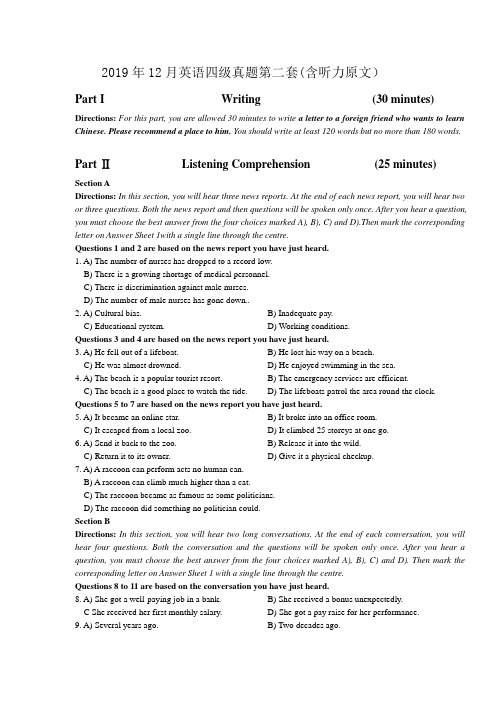
2019年12月英语四级真题第二套(含听力原文)Part I Writing (30 minutes)Directions: For this part, you are allowed 30 minutes to write a letter to a foreign friend who wants to learn Chinese. Please recommend a place to him. You should write at least 120 words but no more than 180 words.Part ⅡListening Comprehension (25 minutes)Section ADirections:In this section, you will hear three news reports. At the end of each news report, you will hear two or three questions. Both the news report and then questions will be spoken only once. After you hear a question, you must choose the best answer from the four choices marked A), B), C) and D).Then mark the corresponding letter on Answer Sheet 1with a single line through the centre.Questions 1 and 2 are based on the news report you have just heard.1. A) The number of nurses has dropped to a record low.B) There is a growing shortage of medical personnel.C) There is discrimination against male nurses.D) The number of male nurses has gone down..2. A) Cultural bias. B) Inadequate pay.C) Educational system. D) Working conditions.Questions 3 and 4 are based on the news report you have just heard.3. A) He fell out of a lifeboat. B) He lost his way on a beach.C) He was almost drowned. D) He enjoyed swimming in the sea.4. A) The beach is a popular tourist resort. B) The emergency services are efficient.C) The beach is a good place to watch the tide. D) The lifeboats patrol the area round the clock. Questions 5 to 7 are based on the news report you have just heard.5. A) It became an online star. B) It broke into an office room.C) It escaped from a local zoo. D) It climbed 25 storeys at one go.6. A) Send it back to the zoo. B) Release it into the wild.C) Return it to its owner. D) Give it a physical checkup.7. A) A raccoon can perform acts no human can.B) A raccoon can climb much higher than a cat.C) The raccoon became as famous as some politicians.D) The raccoon did something no politician could.Section BDirections:In this section, you will hear two long conversations. At the end of each conversation, you will hear four questions. Both the conversation and the questions will be spoken only once. After you hear a question, you must choose the best answer from the four choices marked A), B), C) and D). Then mark the corresponding letter on Answer Sheet 1 with a single line through the centre.Questions 8 to 11 are based on the conversation you have just heard.8. A) She got a well-paying job in a bank. B) She received a bonus unexpectedly.C She received her first monthly salary. D) She got a pay raise for her performance.9. A) Several years ago. B) Two decades ago.C) Right after graduation. D) Just last month.10. A) He sent a small check to his parents. B) He took a few of his friends to a gym.C) He immediately deposited it in a bank. D) He treated his parents to a nice meal.11. A) Buy some professional clothes. B) Budget her salary carefully.C) Join her colleagues for gym exercise. D) Visit her former university campus.Questions 12 to 15 are based on the conversation you have just heard.12. A) He has a difficult decision to make. B) He has been overworked recently.C) He has just quarreled with his girlfriend. D) He has just too many things to attend to.13. A) Give priority to things more urgent. B) Turn to his girlfriend for assistance.C) Think twice before making the decision. D) Seek advice from his family and advisor.14. A) His parents and advisor have different opinions.B) He is not particularly keen on the job offered.C) He lacks the money for his doctoral program.D) His girlfriend does not support his decision.15. A) They need time to make preparations. B) They need to save enough money for it.C) They haven’t started their careers yet. D) They haven’t won their parents’ approval.Section CDirections:In this section, you will hear three passages. At the end of each passage, you will hear three or four questions. Both the passage and the questions will be spoken only once. After you hear a question, you must choose the best answer from the four choices marked A), B), C) and D). Then mark the corresponding letter on Answer Sheet 1 with a single line through the centre.Questions 16 to 18 are based on the passage you have just heard.16. A) Acquiring information and professional knowledge.B) Using information to understand and solve problems.C) Enriching social and intellectual lives.D) Expressing ideas and opinions freely.17. A) Improving mind-reading strategies. B) Reading classic scientific literature.C) Playing games that challenge one’s mind. D) Traveling to different places in the world.18. A) Give others freedom to express themselves. B) Expose themselves to different cultures.C) Discard personal biases and prejudices. D) Participate in debates or discussions.Questions 19 to 21 are based on the passage you have just heard.19. A) The nature of relationships between dogs. B) The reason a great many people love dogs.C) Why dogs can be faithful friends of humans. D) How dogs feel about their bonds with humans.20. A) They have an unusual sense of responsibility. B) They can respond to humans’ questions.C) They can fall in love just like humans. D) They behave like other animals in many ways.21. A) They have their own joys and sorrows. B) They experience true romantic love.C) They help humans in various ways. D) They stay with one partner for life.Questions 22 to 25 are based on the passage you have just heard.22. A) A cow bone. B) A rare animal.C) A historical site. D) A precious stone.23. A) Measuring it. B) Preserving it.C) Dating it. D) Identifying it.24. A) The site should have been protected. B) The boy’s family had acted correctly.C) The boy should have called an expert. D) The channel needs to interview the boy.25. A) Search for similar fossils elsewhere. B) Ask the university to reward Jude.C) Conduct a more detailed search. D) Seek additional funds for the search.Part ⅢReading Comprehension (40 minutes)Section ADirections:In this section, there is a passage with ten blanks. You are required to select one word for each blank from a list of choices given in a word bank following the passage. Read the passage through carefully before making your choices. Each choice in the bank is identified by a letter. Please mark the corresponding letter for each item on Answer Sheet 2 with a single line through the centre. You may not use any of the words in the bank more than once.Questions 26 to 35 are based on the following passage.Finally, some good news about airplane travel. If you are on a plane with a sick passenger, you are unlikely to get sick. That is the 26 of a new study that looked at how respiratory viruses 27 on airplanes. Researchers found that only people who were seated in the same row as a passenger with the flu, for example —or one row in front of or behind that individual—had a high risk of catching the illness. All other passengers had only a very 28 chance of getting sick, according to the findings. Media reports have not necessarily presented 29 information about the risk of getting infected on an airplane in the past. Therefore, these new findings should help airplane passengers to feel less 30 to catching respiratory infections while traveling by air.Prior to the new study, litter was known about the risks of getting 31 infected by common respiratory viruses, such as the flu or common cold, on an airplane, the researchers said. So, to 32 the risks of infection, the study team flew on 10 different 33 in the U.S. during the flu season. The researchers found that passengers sitting within two seats on 34 side of a person infected with flu, as well as those sitting one row in front of or behind this individual, had about an 80 person chance of getting sick. But other passengers were 35 safe from infection. They had a less than 3 percent chance of catching the flu.Section BDirections: In this section, you are going to read a passage with ten statements attached to each statement contains information given in one of the paragraphs. Identify the paragraph from which the information is derived. You may choose a paragraph more than once. Each paragraph is marked with a letter. Answer the questions by marking the corresponding letter on Answer Sheet 2.Is Breakfast Really the Most Important Meal of the Day?[A] Along with old classics like “carrots give you night vision” and “Santa doesn’t bring toys to misbehaving children”, one of the most well-worn phrases of tired parents everywhere is that breakfast is the most important meal of the day. Many of us grow up believing that skipping breakfast is a serious mistake—even if only two thirds of adults in the UK eat breakfast regularly, according to the British Dietetic Association, and around three-quarters of Americans.[B] “The body uses a lot of energy stores for growth and repair through the night,” explains diet specialistSarah Elder. “Eating a balanced breakfast helps to up our energy, as well as make up for protein and calcium used throughout the night.” But there’s widespread disagreeme nt over whether breakfast should keep its top spot in the hierarchy of meals. There have been concerns around the sugar content of cereal and the food industry’s involvement in pro-breakfast research—and even one claim from an academic that breakfast is “dangerous”.[C] What’s the reality? Is breakfast a necessary start to the day or a marketing tactic by cereal companies? The most researched aspect of breakfast (and breakfast-skipping) has been its links to obesity. Scientists have different theories as to why there’s a relationship between the two. In one US study that analyzed the health data of 50,000 people over seven years, researchers found that those who made breakfast the largest meal of the day were more likely to have a lower body mass index (BMI) than those who ate a large lunch or dinner. The researchers argued that breakfast helps reduce daily calorie intake and improve the quality of our diet—since breakfast foods are often higher in fiber and nutrients.[D] But as with any study of this kind, it was unclear if that was the cause—or if breakfast-skippers were just more likely to be overweight to begin with. To find out, researchers designed a study in which 52 obese women took part in a 12-week weight loss program. All had the same number of calories over the day, but half had breakfast, while the other half did not. What they found was that it wasn’t breakfast itself that caused the participants to lose weight: it was changing their normal routine.[E] If breakfast alone isn’t a guarantee of wei ght loss, why is there a link between obesity and skipping breakfast? Alexandra Johnstone, professor of appetite research at the University of Aberdeen, argues that it may simply be because breakfast-skippers have been found to be less knowledgeable about nutrition and health. “There are a lot of studies on the relationship between breakfast eating and possible health outcomes, but this may be because those who eat breakfast choose to habitually have health-enhancing behaviors such as not smoking and regula r exercise,” she says.[F] A 2016 review of 10 studies looking into the relationship between breakfast and weight management concluded there is “limited evidence” supporting or refuting the argument that breakfast influences weight or food intake, and more evidence is required before breakfast recommendations can be used to help prevent obesity.[G] Researchers from the University of Surrey and University of Aberdeen are halfway through research looking into the mechanisms behind how the time we eat influences body weight. Early findings suggest that a bigger breakfast is beneficial to weight control. Breakfast has been found to affect more than just weight. Skipping breakfast has been associated with a 27% increased risk of heart disease, a 21% higher risk of type 2 diabetes men, and a 20% higher risk of type 2 diabetes in women. One reason may be breakfast’s nutritional value—partly because cereal is fortified with vitamins. In one study on the breakfast habits of 1,600 young people in the UK, researchers found that the fiber and micronutrient intake was better in those who had breakfast regularly. There have been similar findings in Australia, Brazil, Canada and the US.[H] Breakfast is also associated with improved brain function, including concentration and language use. A review of 54 studies found that eating breakfast can improve memory, though the effects on other brain functions were inconclusive. However, one of the review’s researchers, Mary Beth Spitznagel, says there is “reasonable” evidence break fast does improve concentration—there just needs to be more research. “Looking at studies that tested concentration, the number of studies showing a benefit was exactly the same as the number that found no benefit,” she says.“And no studies found that eat ing breakfast was bad for concentration.”[I] What’s most important, some argue, is what we eat for breakfast. High-protein breakfasts have been found particularly effective in reducing food and consumption later in the day, according to research by theAustralian Commonwealth Scientific and Industrial Research Organization. While cereal remains a firm favorite among breakfast consumers in the UK and US, a recent investigation into the sugar content of “adult” breakfast cereals found that some cereals contain more than three quarters of the recommended daily amount of free sugars in each portion, and sugar was the second or third highest ingredient in cereals.[J] But some research suggests if we’re going to eat sugary foods, it’s best to do it early. One re cruited 200 obese adults to take part in a 16-week-long diet, where half added dessert to their breakfast, and half didn’t. Those who added dessert lost an average of 40 pounds more—however, the study was unable to show the long-term effects. A review of 54 studies found that there is no consensus yet on what type of breakfast is healthier, and concluded that the type of breakfast doesn’t matter as much as simply eating something.[K] While there’s no conclusive evidence on exactly what we should be eating and when, the consensus is that we should listen to our own bodies and eat when we’re hungry. “Breakfast is most important for people who are hungry when they wake up,” Johnstone says. Every body starts the day differently—and those individual differences need to be researched more closely, Spitznagel says. “A balanced breakfast is really helpful, but getting regular meals throughout the day is more important to leave blood sugar stable through the day, which helps control weight and hunger levels,” says El der, “Breakfast isn’t the only meal we should be getting right.”36. According to one professor, obesity is related to a lack of basic awareness of nutrition and health.37. Some scientists claim that people should consume the right kind of food at breakfast.38. Opinions differ as to whether breakfast is the most important meal of the day.39. It has been found that not eating breakfast is related to the incidence of certain diseases in some countries.40. Researchers found it was a change in eating habits rather than breakfast itself that induced weight loss.41. To keep oneself healthy, eating breakfast is more important than choosing what to eat.42. It is widely considered wrong not to eat breakfast.43. More research is needed to prove that breakfast is related to weight loss or food intake.44. People who priorities breakfasts tend to have lower calorie but higher nutritional intake.45. Many studies reveal that eating breakfast helps people memories and concentrate.Section CDirections: There are 2 passages in this section. Each passage is followed by some questions or unfinished statements. For each of them there are four choices marked A), B), C) and D). You should decide on the best choice and mark the corresponding letter on Answer Sheet 2 with a single line through the centre.Passage OneQuestions 46 to 50 are based on the following passage.Textbooks represent an 11 billion dollar industry, up from $8 billion in 2014. Textbook publisher Pearson is the largest publisher—of any kind—in the world.It costs about $1 million to create a new textbook. A freshman textbook will have dozens of contributors, from subject-matter experts through graphic and layout artists to expert reviewers and classroom testers. Textbook publishers connect professors, instructors and students in ways that alternatives, such as Open E-Textbooks and Open Educational Resources, simply do not. This connection happens not only by means of collaborative development, review and testing, but also at conferences where faculty regularly decide on their textbooks and curricula for the coming year.It is true that textbook publishers have recently reported losses, largely due to students renting or buying used print textbooks. But this can be chalked up to the exorbitant cost of their books—which has increased over 1,000 percent since 1977. A reshuffling of the textbook industry may well be in order. But this does not mean the end of the textbook itself.While they may not be as dynamic as an iPad, textbooks are not passive or lifeless. For example, over the centuries, they have simulated dialogue in a number of ways. From 1800 to the present day, textbooks have done this by posing questions for students to answer inductively. That means students are asked to use their individual experie nce to come up with answers to general questions. Today’s psychology texts, for example, ask: “How much of your personality do you think you inherited?” while ones in physics say: “How can you predict where the ball you tossed will land?”Experts observe t hat “textbooks come in layers, something like an onion.” For the active learner, engaging with a textbook can be an interactive experience: Readers proceed at their own pace. They “customize” their books by engaging with different layers and linkages. Highlighting, Post-It notes, dog-ears and other techniques allow for further customization that students value in print books over digital forms of books.46. What does the passage say about open educational resources?A) They contribute to teaching as much as to learning.B) They don’t profit as much as traditional textbooks do.C) They can’t connect professors and students as textbooks do.D) They compete fiercely for customers with textbook producers.47. What is the main cause of the publishers’ losses?A) Failure to meet student need. B) Industry restructuringC) Emergence of e-books. D) Falling sales.48. What does the textbook industry need to do?A) Reform its structures. B) Cut its retail prices.C) Find replacements for printed textbooks. D) Change its business strategy periodically.49. What are students expected to do in the learning process?A) Think carefully before answering each question.B) Ask questions based on their own understanding.C) Answer questions using their personal experience.D) Give answers showing their respective personality.50. What do experts say about students using textbooks?A) They can digitalize the prints easily. B) They can learn in an interactive way.C) They can purchase customized versions. D) They can adapt the material themselves.Passage TwoQuestions 51 to 55 are based on the following passage.When we think of animals and plants, we have a pretty good way of dividing them into two distinct groups: one converts sunlight into energy and the other has to eat food to make its energy. Well, those dividing lines come crashing down with the discovery of a sea slug that is truly half animal and half plant. It’s pretty incredible how it has managed to hijack the genes of the algae on which it feeds.The slugs can manufacture chlorophyll, the green pigment in plants that captures energy from sunlight, and hold these genes within their body. The term kleptoplasty is used to describe the practice of using hijacked genes to create nutrients from sunlight. And so far, this green sea slug is the only known animal that can be truly considered solar-powered, although some animals do exhibit some plant-like behaviors. Many scientists have studied the green sea slugs to confirm that they are actually able to create energy from sunlight.In fact, the slugs use the genetic material so well, they pass it on to their further generations. The babies retain the ability to produce their own chlorophyll, though they can’t generate energy from sunlight until they’ve eaten enough algae to steal the necessary genes, which they can’t yet produce on their own.”“There is no way on earth that genes from an alga should work inside an animal cell,” says Sidney Piercefrom the University of South Florida. “And yet here, they do. They all ow the animal to rely on sunshine for its nutrition. So if something happens to their food source, they have a way of not starving to death until they find more algae to eat.”The sea slugs are so good at gathering energy from the sun that they can live up to 9 months without having to eat any food. They get all their nutritional needs met by the genes that they’ve hijacked from the algae.51. What is the distinctive feature of a sea slug?A) It looks like both a plant and an animal. B) It converts some sea animals into plants.C) It lives half on animals and half on plants. D) It gets energy from both food and sunlight.52. What enables the sea slug to live like a plant?A) The genes it captures from the sea plant algae. B) The mechanism by which it conserves energy.C) The nutrients it hijacks from other species. D) The green pigment it inherits from its ancestors.53. What does the author say about baby sea slugs?A) They can live without sunlight for a long time.B) They can absorb sunlight right after their birth.C) They can survive without algae for quite some time.D) They can produce chlorophyll on their own.54. What does Sidney Pierce say about genes from an alga?A) They are stolen from animals like the sea slug. B) They can’t function unless exposed to sunlight.C) They don’t usually function inside animal cells. D) They can readily be converted to sea slug genes.55. What do we learn about sea slugs from the passage?A) They behave the way most plant species do. B) They can survive for months without eating.C) They will turn into plants when they mature. D) They will starve to death without sunlight.Part ⅣTranslation (30 minutes)Directions:For this part, you are allowed 30 minutes to translate a passage from Chinese into English. You should write your answer on Answer Sheet 2.中国的家庭观念与其文化传统有关。
- 1、下载文档前请自行甄别文档内容的完整性,平台不提供额外的编辑、内容补充、找答案等附加服务。
- 2、"仅部分预览"的文档,不可在线预览部分如存在完整性等问题,可反馈申请退款(可完整预览的文档不适用该条件!)。
- 3、如文档侵犯您的权益,请联系客服反馈,我们会尽快为您处理(人工客服工作时间:9:00-18:30)。
2019大学英语四级考试听力备考笔记(28)
[P31-9]
A) The man thinks the woman is wasting her time.
B) The man thinks the woman should make full use of her time.
C) The man can wait and there is no need for her to hurry.
D) The man is eager to know the woman's answer.
W: I have to think about your offer. I can't say "yes" or "no" at the moment.
M: You can take your time. It will do if you let me know your decision in a day or two.
Q: Which of the following is true?
注:1. You can take your time. 不着急。
There's no rush. What's the rush?
2. do =do some good/ work/ help 解决问题,起作用,好用,好使
[P33-2]
A) It was pretty good.
B) It was rather dull.
C) It was not well organized.
D) It was attended by many people.
W: Let's talk about the preparations for the party.
M: Right. We really need to plan better this time. Remember what a mess it was at the last party!
Q: What do we know about the last party?
注:1. dull (人)笨;(书)boring;(刀)钝 2. mess 乱糟糟
[P36-3]
A) She has to change the time for the trip.
B) She hasn't decided where to go next month.
C) She can't afford the time for the trip.
D) She will manage to leave this month.
M:You’re going to make a trip to San Francisco, aren’t you?
W:Yes. But I haven’t got the plane ticket yet. I’m thinking of postponing the trip to next month since this is the busiest month for the airlines.
Q: What do we know about the woman from this conversation?
注:trip 旅行;摔跟头。
